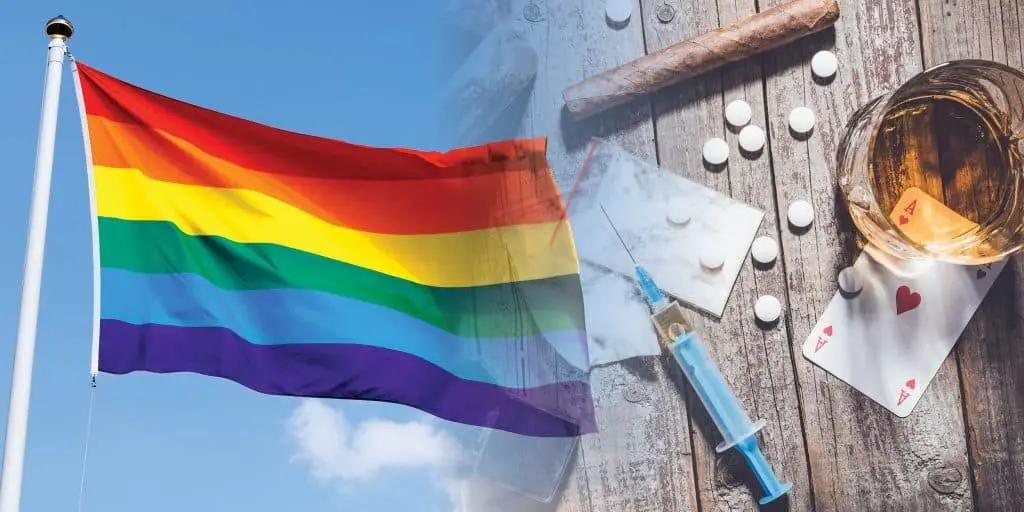LGBTQ individuals are more likely to use substances due to chronic stress and other challenges unique to this population. Fortunately, effective, LGBTQ-friendly treatment options are available.
The potential struggles experienced by a person who is a part of the LGBTQ community range from negative social stigma to being more likely to be a victim of violent crime. While many strides have been made in the LGBTQ rights movement, this group of people continues to experience heightened levels of daily stress, which can lead to substance use or mental health challenges. LGBTQ mental health and substance use resources are vital to providing additional support for these communities.
The LGBTQ Community And Substance Abuse
Studies show that identifying as LGBTQ and having a substance use disorder are closely related. Not only is substance use more common in the LGBTQ community, but substance use also tends to begin at an earlier age.
Drugs of Choice In The LGBTQ Community
In one study, LGBTQ adults were found to be more likely to drink heavily and to engage in binge drinking episodes. Another study reported that members of the LGBT community were ten times more likely to have used cocaine in the past month than the general population.
Treatment Can Be Life Changing. Reach out today.

It is possible for a person in the LGBTQ community to use any substance, but studies have pointed to a few substances that are used most frequently by LGBTQ individuals as a group, including:
- Marijuana
- Cocaine
- Ecstasy
- Amphetamines
Why Is The LGBTQ Community More Susceptible To Addiction?
Compared to their sexual majority peers, LGBTQ youth are twice as likely to use substances. Nearly 2 out of every 5 LGBTQ youth reported using drugs in the past year. Members of the LGBTQ community are not only more likely to have a substance use disorder but are also more likely to have a more severe substance use disorder.
Understanding why members of the LGBTQ community are more likely to use substances is key to changing these statistics. Knowing why a person is more likely to turn to substance use can help their friends and family to be more supportive. This knowledge can also inform outreach efforts and demonstrate areas of need.
There are many reasons a person in the LGBTQ community may use substances. Some of the most common include:
- Harassment
- Discrimination
- Negative stigma
- Lack of family support
- Sense of social isolation
While each of these issues alone may cause a person to turn to substance use, often there is a combination of root causes. Each of these chronically stressful experiences may also increase the chance of a person developing a mental health condition, such as depression or anxiety.
The problem may be even worse for youth as LGBTQ youth, who are more likely to be bullied, excluded, or assaulted at school compared to their heterosexual peers. They are less likely to have a trusted, supportive adult in their family.
Challenges Faced By the LGBTQ Community

The additional stressors affecting the LGBTQ community lead to additional challenges. When substance use is also occurring, there is an even greater risk that these challenges may be present. Likewise, when these additional challenges are present, substance use becomes more likely.
It has been estimated that 20% of homeless youth identify as LGBTQ despite the fact that LGBTQ youth only account for 10% of the general youth population. Homeless, LGBTQ youth are also more likely to experience additional stressors and challenges while homeless, including increased risk of victimization and sexual violence, higher rates of mental health concerns, and a greater probability of attempting and completing suicide.
Mental Health And Co-Occurring Disorders Among The LGBTQ Community
LGBTQ adults are two times more likely than heterosexual adults to experience mental health concerns. This may be due to chronic stress often experienced by this population as a result of discrimination. LGBTQ individuals are also more likely to experience suicidal thoughts and attempt suicide.
Common LGBTQ mental health conditions and concerns include:
- Depression
- Increased risk for suicide
- Anxiety
- High levels of stress
Where Should LGBTQ Individuals Undergo Treatment?
One study found that treatment programs tailored specifically for LGBT men had better outcomes for this group than those who did not receive this specialized treatment. However, only 7.4% of programs offer this type of specialized services. When seeking treatment, it may be preferable to find a program that is either specifically for LGBTQ individuals or has specialized programs or groups for LGBTQ patients.
LGBTQ Friendly Treatment Centers
To determine if a facility is LGBTQ friendly, it may be helpful to ask the staff about their programs and experience with LGBTQ patients. Some questions you may want to ask include:
- What specialized services do you offer for LGBTQ individuals?
- Have any of your counselors received special training or continuing education regarding treating LGBTQ individuals?
- What has the experience been like for LGBTQ individuals at your center in the past?
- What measures are taken to ensure your program is a safe space for LGBTQ individuals?
- Does the program take sexual orientation and identity into consideration with living arrangements?









